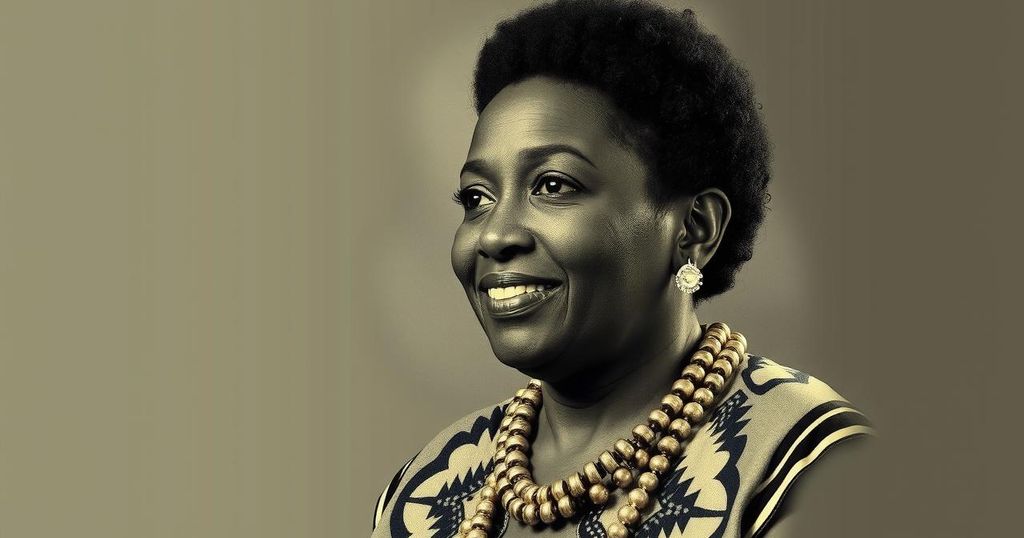Netumbo Nandi-Ndaitwah: A Historic Leap as Namibia’s First Female President

Netumbo Nandi-Ndaitwah, a long-term member of Swapo, has become Namibia’s first female president after securing over 57% of the votes in a contested election. Born to a prominent family and a former freedom fighter, her leadership journey emphasizes women’s rights and economic reform. Despite rival claims of electoral flaws, Nandi-Ndaitwah’s extensive political background positions her as a significant force in the future of Namibia.
Netumbo Nandi-Ndaitwah, often referred to as NNN, has made significant history as Namibia’s inaugural female president, winning over 57% of the electoral votes. At the age of 72, she has experienced a remarkable journey from being a fearless freedom fighter to assuming the highest political office in her country. Despite her success, her victory has faced controversy; her rival, Panduleni Itula, claims the election process was flawed and has announced intentions to contest the results in court. Nandi-Ndaitwah has a longstanding affiliation with the ruling party, Swapo, advocating for economic reform and women’s rights in Namibia.
Born in 1952 in Onamutai, Namibia, she was the ninth of thirteen children in a family where her father served as an Anglican clergyman. Her political involvement commenced at a young age when she joined Swapo at just 14 years old, motivated by the desire to end South Africa’s oppressive rule in Namibia. Despite her youth, she rose to the position of leader within Swapo’s Youth League, expanding her influence in the fight for independence. After facing arrest as a high school student for her activism, Nandi-Ndaitwah sought refuge in exile, continuing her efforts in neighboring countries and earning a degree in International Relations from the United Kingdom.
Following Namibia’s independence in 1988, she returned and integrated into the newly established government, where she held various ministerial roles. Nandi-Ndaitwah has been an influential proponent of women’s rights, notably championing the Combating of Domestic Violence Act in 2002, overcoming significant resistance in a traditionally male-dominated political environment. She has been acknowledged for her practical approach to leadership, firmly asserting, “I am an implementer, not a storyteller.” After serving as vice-president, she ascended to the presidency following the passing of former President Hage Geingob.
In her private life, she is married to Epaphras Denga Ndaitwah, a former chief of Namibia’s defense forces, and they have three sons. Nandi-Ndaitwah’s commitment to her country and progressive ideals positions her as a pivotal figure in Namibia’s ongoing political landscape.
The election of Netumbo Nandi-Ndaitwah as Namibia’s first female president marks a significant milestone in the country’s political history. It reflects not only a growing trend toward gender equality but also the ongoing evolution of Namibia’s democratic processes after years of struggle against colonial rule. Her career is deeply intertwined with the Swapo party, which has been a dominant force in Namibia since its independence. Her extensive experience in various governmental roles enhances her capability to lead, especially in the context of economic transformation, which remains a key priority for Namibia moving forward. The challenges she faces, including allegations of electoral misconduct, highlight the complexities of governance and political legitimacy in the region.
In summary, Netumbo Nandi-Ndaitwah’s ascension to the presidency symbolizes a historic shift for Namibia, representing female empowerment and resilience in leadership. Her long-standing commitment to the liberation movement and women’s advocacy has shaped her career and ambitions for economic transformation in the nation. While her victory has been contested, her determination and practical leadership style suggest she may define a new era for Namibia as it navigates its socio-economic challenges.
Original Source: www.bbc.co.uk







